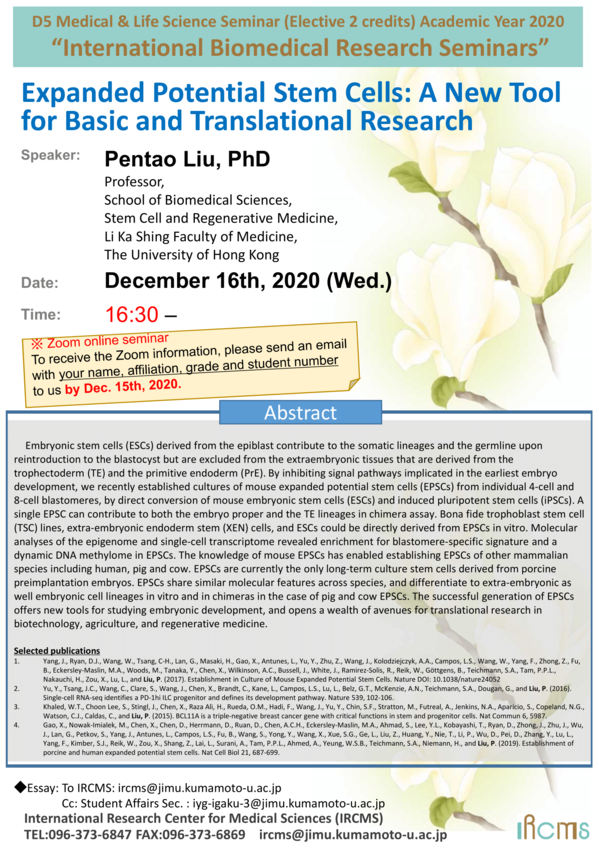- HOME
- News & Events
- [Dec.16] D5 Medical & Life Science Seminar-Dr. Pentao Liu
News & Events
[Dec.16] D5 Medical & Life Science Seminar-Dr. Pentao Liu
November 30 2020
The "D5 Medical & Life Science Seminar" course will be offered by International Research Center for Medical Sciences (IRCMS). It will run from April 2020 to March 2021, with lectures given by scientists who are affiliated with IRCMS or in collaboration with researchers at IRCMS. The lectures will be given once a month, in English, and by leading scientists in the relevant research field. Students will be taught: 1) how normal physiological functions are maintained in the human body; 2) how these systems become abnormal under certain pathophysiologic conditions; 3) why stem cells are important in animal development and homeostasis; 4) how stem cell-based approaches can help us understand disease mechanisms and find potential cure for diseases related to stem cell malfunction (e.g., cancer, aging).
Date : December 16, 2020 (Wednesday)
Time : 16:30 -
* Zoom online seminar
To receive the meeting ID / Password, please send an email to
ircms*jimu.kumamoto-u.ac.jp by December 15, 2020.
(Change * to @ when you send an email.)
Please include your name, affiliation, grade and student number in your email.
Speaker : Pentao Liu, PhD
Professor,
School of Biomedical Sciences,
Stem Cell and Regenerative Medicine,
Li Ka Shing Faculty of Medicine,
The University of Hong Kong
Title : Expanded Potential Stem Cells: A New Tool for Basic and Translational Research
Abstract :
Embryonic stem cells (ESCs) derived from the epiblast contribute to the somatic lineages and the germline upon reintroduction to the blastocyst but are excluded from the extraembryonic tissues that are derived from the trophectoderm (TE) and the primitive endoderm (PrE). By inhibiting signal pathways implicated in the earliest embryo development, we recently established cultures of mouse expanded potential stem cells (EPSCs) from individual 4-cell and 8-cell blastomeres, by direct conversion of mouse embryonic stem cells (ESCs) and induced pluripotent stem cells (iPSCs). A single EPSC can contribute to both the embryo proper and the TE lineages in chimera assay. Bona fide trophoblast stem cell (TSC) lines, extra-embryonic endoderm stem (XEN) cells, and ESCs could be directly derived from EPSCs in vitro. Molecular analyses of the epigenome and single-cell transcriptome revealed enrichment for blastomere-specific signature and a dynamic DNA methylome in EPSCs. The knowledge of mouse EPSCs has enabled establishing EPSCs of other mammalian species including human, pig and cow. EPSCs are currently the only long-term culture stem cells derived from porcine preimplantation embryos. EPSCs share similar molecular features across species, and differentiate to extra-embryonic as well embryonic cell lineages in vitro and in chimeras in the case of pig and cow EPSCs. The successful generation of EPSCs offers new tools for studying embryonic development, and opens a wealth of avenues for translational research in biotechnology, agriculture, and regenerative medicine.
Selected publications:
- Yang, J., Ryan, D.J., Wang, W., Tsang, C-H., Lan, G., Masaki, H., Gao, X., Antunes, L., Yu, Y., Zhu, Z., Wang, J., Kolodziejczyk, A.A., Campos, L.S., Wang, W., Yang, F., Zhong, Z., Fu, B., Eckersley-Maslin, M.A., Woods, M., Tanaka, Y., Chen, X., Wilkinson, A.C., Bussell, J., White, J., Ramirez-Solis, R., Reik, W., Göttgens, B., Teichmann, S.A., Tam, P.P.L., Nakauchi, H., Zou, X., Lu, L., and Liu, P. (2017). Establishment in Culture of Mouse Expanded Potential Stem Cells. Nature DOI: 10.1038/nature24052
- Yu, Y., Tsang, J.C., Wang, C., Clare, S., Wang, J., Chen, X., Brandt, C., Kane, L., Campos, L.S., Lu, L., Belz, G.T., McKenzie, A.N., Teichmann, S.A., Dougan, G., and Liu, P. (2016). Single-cell RNA-seq identifies a PD-1hi ILC progenitor and defines its development pathway. Nature 539, 102-106.
- Khaled, W.T., Choon Lee, S., Stingl, J., Chen, X., Raza Ali, H., Rueda, O.M., Hadi, F., Wang, J., Yu, Y., Chin, S.F., Stratton, M., Futreal, A., Jenkins, N.A., Aparicio, S., Copeland, N.G., Watson, C.J., Caldas, C., and Liu, P. (2015). BCL11A is a triple-negative breast cancer gene with critical functions in stem and progenitor cells. Nat Commun 6, 5987.
- Gao, X., Nowak-Imialek, M., Chen, X., Chen, D., Herrmann, D., Ruan, D., Chen, A.C.H., Eckersley-Maslin, M.A., Ahmad, S., Lee, Y.L., Kobayashi, T., Ryan, D., Zhong, J., Zhu, J., Wu, J., Lan, G., Petkov, S., Yang, J., Antunes, L., Campos, L.S., Fu, B., Wang, S., Yong, Y., Wang, X., Xue, S.G., Ge, L., Liu, Z., Huang, Y., Nie, T., Li, P., Wu, D., Pei, D., Zhang, Y., Lu, L., Yang, F., Kimber, S.J., Reik, W., Zou, X., Shang, Z., Lai, L., Surani, A., Tam, P.P.L., Ahmed, A., Yeung, W.S.B., Teichmann, S.A., Niemann, H., and Liu, P. (2019). Establishment of porcine and human expanded potential stem cells. Nat Cell Biol 21, 687-699.
Flyer:

